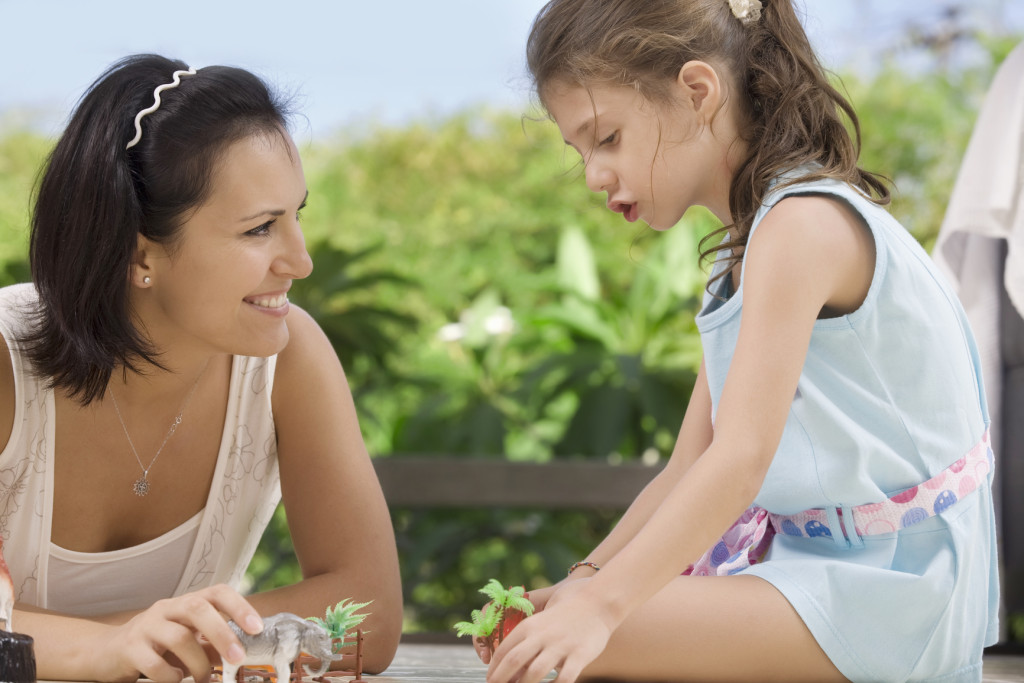One of the chief complaints I hear from parents in my practice is that their kids “don’t listen.” Parents often report feeling “disrespected” and are “tired of yelling.” Why is it that kids don’t listen? How can parents end the cycle of yelling, threats, bribes and other punishment?
The thing is, listening is not a skill we’re born with, it’s one that must be taught. Like any other skill, it takes practice and patience. What we know is that kids listen after they feel listened to and, ultimately, children learn what we model. When we, as parents, take the time to really “tune in” and pay close attention to our child, we demonstrate what listening looks like and, more importantly, what it FEELS like.

Think about a time you felt upset. Perhaps you had a bad day at work or were feeling stressed after your child’s third meltdown of the day. Now let’s say you went to a friend for support. Which response would you rather hear?:
A.) “Oh, get over it. It’s not that big of a deal. You should hear what happened to me today!”
Or
B.) “Wow, sounds like you had quite a day. I’m so sorry. Tell me more about it.”
Consider what each of these responses elicits in you. For many, response A minimizes and dismisses feelings, whereas response B shows empathy and validation, with an invitation to elaborate on the experience. When your child is experiencing strong emotions (in the form of tantrums, talking back, yelling etc.), be aware that is his way of sending you a message that he needs help understanding and managing his immense feelings. When we understand this, we are in a much better position to choose a response that invites connection and cooperation.
All misbehavior is a communication. Because the rational part of a child’s brain is not yet fully developed (it won’t be fully developed until early adulthood!), it’s unrealistic to expect her to process and manage such overwhelming emotions if we haven’t taught her how to do so. Children need our guidance, not punishment. Punishment derails the trust and connection we have with our child. While it may work in the short term as far as stopping a particular behavior, the long-term effects can be detrimental to a child’s sense of security and emotional well-being.
If you’re wondering how else you can foster more positive, cooperative behavior in your child, consider these 6 gentle tips:
1. Take care of yourself – emotionally and physically. It begins with us. Get plenty of rest. Exercise. Meditate. Journal. Find something that brings you joy (or just a moment to yourself!). Build a supportive tribe of friends and family you can rely on.
2. Connect before you “correct.” Make sure you are in a calm state, and then get down on your child’s level (below eye level is best). Gently put your hand on his/her back. Speak softly and slowly. This is one way in which to model respect.
3. Use empathy and validate your child’s emotions. Unmet needs and underlying emotions are what drive misbehavior. Your child is not out to get you. As discussed above, he needs help with his overwhelming emotions. When our child feels our understanding and acceptance of his feelings, he is in a better position to engage the more logical, rational part of his brain and becomes more receptive to problem solving and guidance.
4. Establish 1:1 time with your child/ren (aka “Special Time”). Set aside time each week (daily, if possible) with each child where they get 100% of your undivided, focused attention (eliminate distractions such as TV’s, cell phones, siblings). This is your time to bond with the message being, “I’m all yours!” Kids who feel connected to their parents have much less need to misbehave!
5. Ask, don’t tell. When we make commands, we put our child on the defensive and invite resistance. Instead, try phrasing your request in the form of a question. Not only does this invite cooperation, but it also helps build critical thinking, decision-making and problem-solving skills. For example, “What do you need to put on your feet so we can leave?” vs. “Put on your shoes!” “What is your plan for getting your homework done?” vs. “Go do your homework.” “Where do the toys go when we are finished playing with them?” vs. “Pick up these toys!”
6. Be playful, silly and have fun! Our children want more than anything to please us and connect. They long to feel a sense of belonging (connection) and significance (that they matter/have something meaningful to contribute). Join your child in what they love most of all – to play and have fun. Isn’t this what childhood (and life) is all about!?
Listening is a skill. It takes time, patience and practice to develop. When we take the time to listen to our kids, not just with our ears, but also with our hearts, amazing things can happen. It starts with us!
All the best,
Debbie
